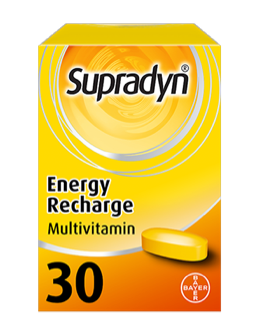FOR HEALTHCARE PROFESSIONALS
How Supradyn works: Role of vitamins and minerals in recovery
Every day, our bodies are working to maintain and restore homeostasis (stable internal environment).
Homeostasis, however, is exposed to everyday challenges that could upset its delicate balance. Among these daily challenges are high energy demands, immune system reactions, seasonal changes, and natural processes such as menstruation. Physical exercise, work, prolonged stress, and our bodies’ response to pathogens and infections all increase the body’s energy expenditure and thus the demand for vitamins and minerals involved in energy production. Micronutrients - vitamins and minerals – take part in numerous homeostatic processes including, for example, energy metabolism, production of hormones and enzymes, maintenance of cells and organs, and many more.
Energy-depleting activities
Increased energy metabolism such as during demanding physical activities, requires key micronutrients for various reactions and processes that take place in mitochondria.1
On a daily basis, suboptimal micronutrient status can lead to low energy, fatigue, tiredness, longer recovery after physical activities, and impaired immunity.
Long term deficiencies, on the other hand, can increase the risk of chronic diseases like osteoporosis, coronary heart disease, and cancer. Our bodies, however, do not generally produce micronutrients and that’s why adequate daily intake of vitamins and minerals is crucial. B-vitamins, iron, copper, magnesium, and coenzyme Q10 (if applicable) contained in Supradyn aid in the body’s recovery, energy and antibody production, and help establish an optimal level of micronutrients.
Recovery and multivitamin supplementation3,4,5
- Greater requirement for vitamins, minerals and CoQ10 involved in energy metabolism
- Ginseng approved use: Prophylactic and restorative agent for enhancement of mental and physical capacities, in cases of weakness, exhaustion, tiredness, and loss of concentration, and during convalescence
- Illness: Greater need for micronutrients to support the immune response and to replenish stores
- Enhance skin and mucosal barrier function: Vitamins A, C, E and zinc
- Cellular immunity: Vitamins A, B6, B12, C, D, E, folic acid, iron, zinc, copper, selenium
- Antibody production: Vitamins A, B6, B12, D, E and folic acid and zinc, copper and selenium
What you should know about energy?
REFERENCES
- Wishart K. Vitamins & Minerals. 2017;6:166.
- Ricci JA, et al. J Occup Environ Med. 2007;49(1):1–10. 2. Huskisson E, et al. J Int Med Res. 2007;35(3):277–289.
- Maggini S. et al., Contribution of selected vitamins and trace elements to immune function. Proceedings of the Nutrition Society, 2008. 67(OCE1): p. E84.
- Maggini S et al., Selected vitamins and trace elements support immune function by strengthening epithelial barriers and cellular and humoral immune responses. British Journal of Nutrition, 2007. 98(S1): p. S29-S35
- Expanded Commission E Monographs (2000) Ginseng in Herbal Medicine: The American Botanical Council; WHO. Radix ginseng, in WHO monographs on selected medicinal plants. 1999, WHO: Geneva. 168-182






